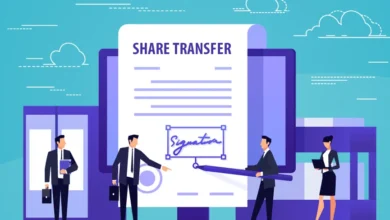Shares Transmission Procedure: A Complete Guide by Share Claimers

Transferring shares after the death of a shareholder is a sensitive and critical task. Understanding the Shares Transmission Procedure is essential to ensure a smooth, lawful, and timely transfer. In this blog, Share Claimers walks you through the entire procedure, documents required, and key steps involved.
What is Shares Transmission Procedure?
The Shares Transmission Procedure refers to the legal process of transferring shares from a deceased shareholder to their legal heirs or nominees. Unlike transfer of shares (which is a sale or gift), transmission occurs due to inheritance, death, insolvency, or lunacy of the shareholder.
This procedure is governed by company law and must be handled carefully to avoid delays and legal complications.
Why Understanding the Shares Transmission Procedure is Important
Failing to follow the correct Shares Transmission Procedure can result in:
- Legal disputes
- Frozen shares
- Ineligibility to receive dividends or attend shareholder meetings
With the help of experts like Share Claimers, this process can be simplified and streamlined.
Step-by-Step Shares Transmission Procedure
1. Check for Nomination
First, verify if the deceased shareholder has registered a nominee with the company. If a nominee exists, the Shares Transmission Procedure is simpler and faster.
In case there is no nomination, the legal heirs must step in and follow a slightly more complex route involving legal documentation.
2. Collect Required Documents
To begin the Share Transmission Procedure, the following documents are generally required:
- Death Certificate (attested copy)
- Succession Certificate or Probate of Will
- Share Certificates (if physical shares)
- Transmission Request Form (TRF)
Having complete documents at the outset avoids delays in processing.
3. Submit the Transmission Request
The legal heir or nominee must fill the Transmission Request Form (TRF) and submit it along with supporting documents to the company’s Registrar and Transfer Agent (RTA) or directly to the company.
For demat shares, the request is submitted to the Depository Participant (DP).
4. Verification and Approval
After submission, the RTA or company will verify the documents. If all documents are in order, they will process the Shares Transmission Procedur and transfer the shares to the legal heir’s or nominee’s name.
The time taken for this process is usually 15–30 working days, depending on document verification.
5. Update of Shareholder Records
Once the transmission is complete, the company updates its records and issues a fresh share certificate or updates the demat account of the new shareholder.
The process is then considered legally complete.
Shares Transmission Procedure in Demat vs Physical Form
Demat Shares
- Faster process
- Involves Depository Participant (e.g., NSDL/CDSL)
- No need for physical share certificates
Physical Shares
- Time-consuming
- Requires original share certificates
- Greater risk of document loss or damage
Share Claimers recommends dematerializing physical shares to simplify future procedures.
Common Mistakes to Avoid in Shares Transmission Procedure
- Incomplete Documentation: Always ensure all documents are signed and attested.
- No Legal Succession Certificate: Without this, heirs cannot claim shares if no nominee exists.
- Delay in Intimation: Inform the company about the shareholder’s death at the earliest.
- Mismatch in Details: Ensure name and address details match across all documents.
How Share Claimers Can Help
At Share Claimers, we specialize in guiding families and investors through the Share Transmission Procedure. Whether it’s obtaining succession certificates, handling demat or physical shares, or dealing with complex legal heirs situations, our team ensures a seamless experience.
We also offer:
- Legal assistance
- Document preparation
- Liaison with RTAs and Depository Participants
Conclusion: Secure Your Financial Legacy with Share Claimers
Understanding the Shares Transmission Procedure is crucial to preserving the legacy and rightful ownership of shareholdings. With the right knowledge and expert help from Share Claimers, you can ensure a smooth, compliant, and stress-free process.
Don’t let legal hurdles delay what is rightfully yours.




